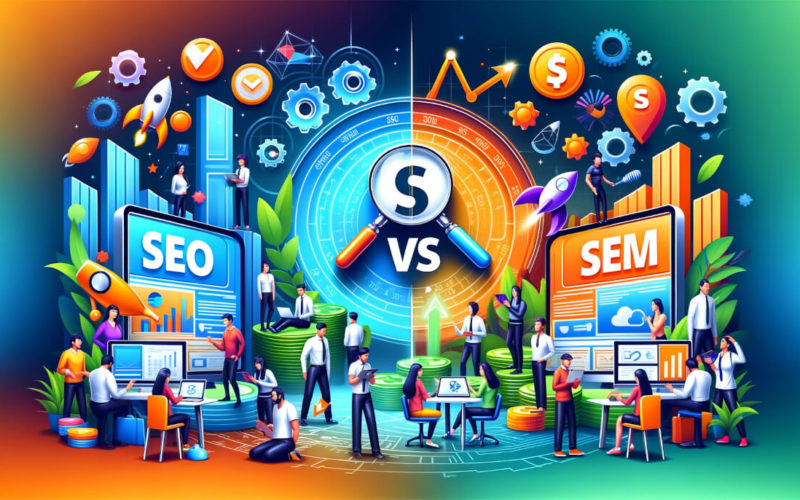Search Engine Optimization (SEO) and Search Engine Marketing (SEM) are linked as they leverage search engines like Google to drive traffic and enhance visibility.
Sometimes the terms are used together to reference a similar set of activities, which can be confusing for those of us who aren’t as familiar with this world.
But while they have the same purposes, there are differences. Marketers need to understand what these are to leverage SEO and SEM in marketing activities and to feed into search intent.
It’s worth mentioning the recent Google API Documentation leak which gave marketers a rare glimpse into what factors the search engine really uses to top rank content.
we look at the key differences between SEO and SEM, and how to use them and successfully to boost the visibility of any product, service, or company and the implications of Artificial Intelligence on search marketing.
Do you know that How Many Searches on Google?
As of recent data, Google processes over 8.5 billion searches per day. This equates to approximately 97,000 (Nine Lac, Seven Thousand) searches per second. The number of searches continues to grow as more people rely on search engines for information, products, and services.
Now something is precious for you just read Comprehensively.
What’s the difference between SEO and SEM?
While SEO focuses on optimizing a website to attract organic traffic, SEM encompasses both organic and paid methods, like Pay-Per-Click (PPC) and programmatic advertising, to drive web traffic.
In essence, SEM includes both paid and organic channels, whereas SEO is solely concerned with organic traffic, making it a part of SEM.
It’s important to note that there’s ongoing debate among SEO experts regarding the effectiveness of paid search, especially with changing search behaviors and the emergence of AI-driven search features like Google’s AI Overviews (SGE). More on that later.
How does SEO work?
SEO (Search Engine Optimization) is the process of improving a website to rank higher in organic search engine results (SERPs). Search engines like Google or Bing analyze (or “crawl”) websites to determine how useful they are for visitors, and they rank websites based on several factors.
Google dominates the search market with 91% of global searches, so most SEO efforts focus on it. However, other search engines like Bing and Yahoo are still relevant, though they have a much smaller share. “Keep in mind, if your website is new, it may take time before Google recognizes and ranks it”.
Given that Google handles “5.9 million searches every minute”, there is a big opportunity for marketers to tap into this traffic. The key is to understand what your audience is searching for and create content that meets their needs.
How Many types of SEO?
There is four Major Type of SEO let read it.
- Technical SEO:- involves optimizing the backend of your website, such as fixing broken links, improving site structure, and correcting metadata to make it more visible and functional for search engines.
- on-page SEO:- focuses on optimizing the content and elements on your website. By researching keywords your audience is searching for, you can create relevant content and improve things like titles, headings, URLs, and internal links.
- off-page SEO:- is about building your website’s reputation through external sources. This includes activities like getting backlinks from trusted sites and gaining online coverage (digital PR).
- Local SEO is important for small businesses and involves optimizing your website to appear in local searches by using local keywords and tools like Google Business Profile.
Hesh-tag
#Google #SEO #SEM #SearchEngineOptimization #SearchEngineMarketing #DigitalMarketing #Traffic #Visibility #OrganicTraffic #PaidAdvertising #PPC #ProgrammaticAdvertising #AI #SearchAlgorithms #ContentMarketing #SearchEngineResults #TechnicalSEO #OnPageSEO #OffPageSEO #LocalSEO #Backlinks #DigitalPR #MarketingStrategy #AudienceEngagement #GoogleAPI #SearchTrends #SearchEngines #WebsiteOptimization #MarketingInsights #ContentCreation
Comma Separated keyword
Google, SEO, SEM, Search-Engine-Optimization, Search Engine Marketing, Digital Marketing, Traffic, Visibility, Organic Traffic, Paid Advertising, Pay-Per-Click, PPC, Programmatic Advertising, Artificial Intelligence, Search Algorithms, Content Marketing, Search Engine Results, Technical SEO, On-Page SEO, Off-Page SEO, Local SEO, Backlinks, Digital PR, Marketing Strategy, Audience Engagement, Google API, Search Trends, Search Engines, Website Optimization, Marketing Insights, Content Creation
Dash Based Tag
Google-SEO-SEM-Search-Engine-Optimization-Search-Engine-Marketing-Digital-Marketing-Traffic-Visibility-Organic-Traffic-Paid-Advertising-Pay-Per-Click-PPC-Programmatic-Advertising-Artificial-Intelligence-Search-Algorithms-Content-Marketing-Search-Engine-Results-Technical-SEO-On-Page-SEO-Off-Page-SEO-Local-SEO-Backlinks-Digital-PR-Marketing-Strategy-Audience-Engagement-Google-API-Search-Trends-Search-Engines-Website-Optimization-Marketing-Insights-Content-Creation

Additional Tags
Search-Engine-Results-Page-SERPs-Keyword-Research-User-Experience-UX-Web-Development-Online-Marketing-Small-Business-Local-Search-Engine-Results-Search-Behavior-Data-Driven-Marketing-Content-Quality-Search-Engine-Visibility-Digital-Strategy-Organic-Search-Paid-Search-Search-Engine-Traffic-Google-Analytics-Google-Business-Profile-Digital-Advertising-Content-Strategy-Search-Intent-Algorithm-Updates-Digital-Transformation
Google uses over 200 ranking factors and its products for Users. Still, some of the most important ones include
keyword optimization, which is which is using the right keywords throughout your site to attract the right audience. Content creation is key and high-quality, valuable content will engage visitors and improve rankings.

